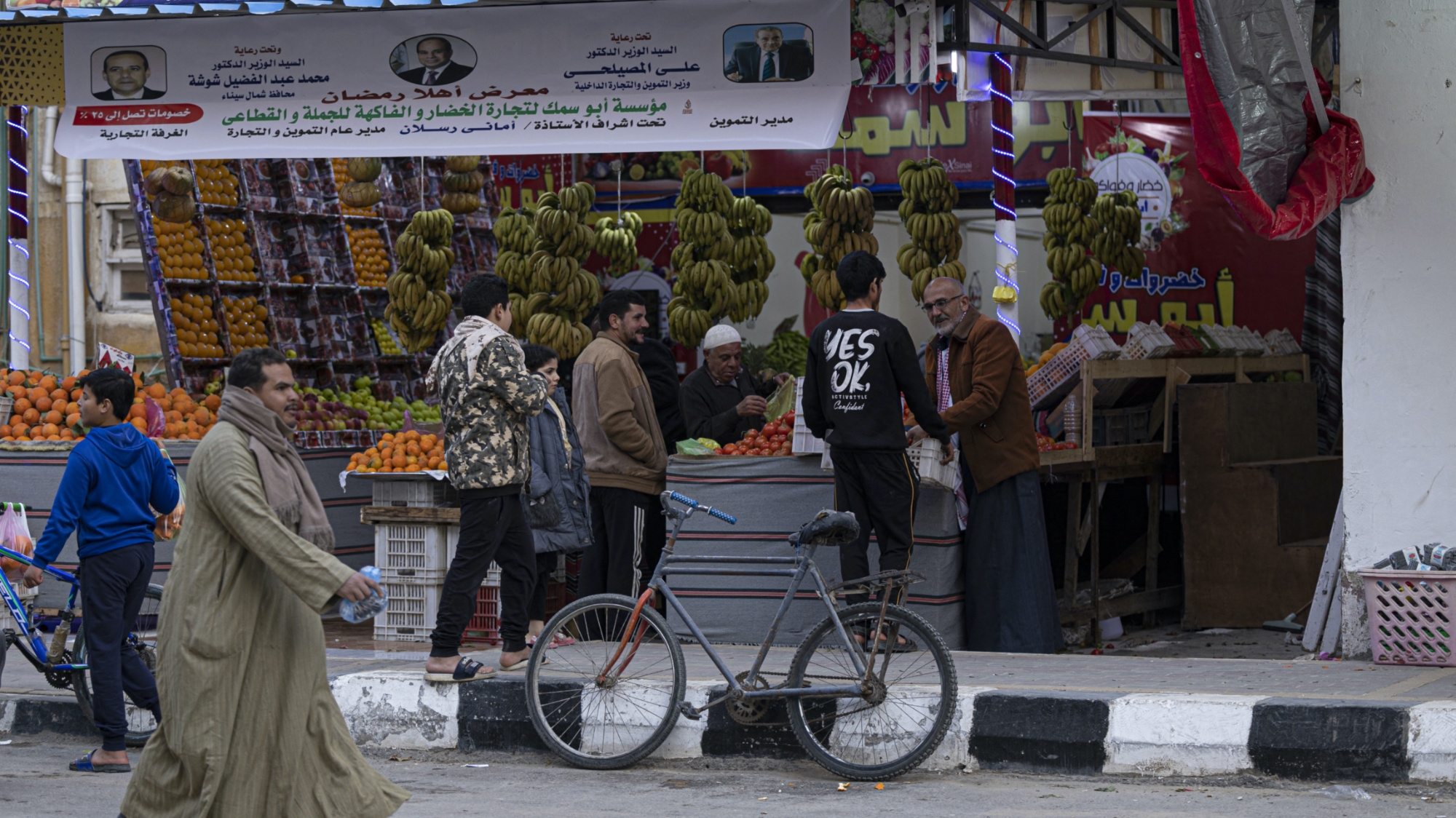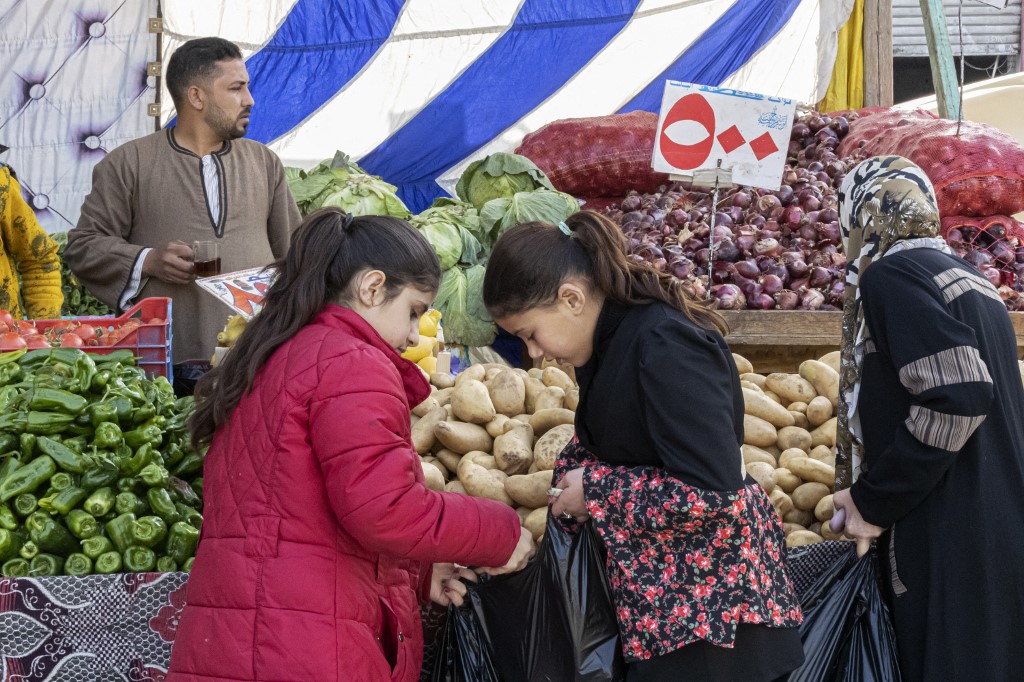Egypt's economy set for further blows after US interest rate hike

Egypt's economy is expected to be strongly affected by the US Federal Reserve's latest interest rate increase on Wednesday, the second in less than two months.
The increase of 0.5 percent was the highest in 22 years, with Egypt one of several emerging markets set to suffer from the move.
Following a two-day policy meeting, the Federal Reserve also said it would shrink its $9tn asset portfolio as of next month, as it seeks to contain rising inflation in the US, which is running at a four-decade high.
The impact on Egypt, according to economic experts who spoke with Middle East Eye, will range from foreign capital flight and weak investor interest in local debt instruments, through to additional pressures on the national currency.
The experts also warned against the toll such developments will have on Egypt's foreign debt and the inflation rate in a country where almost a third of the population of 104 million is poor.
New MEE newsletter: Jerusalem Dispatch
Sign up to get the latest insights and analysis on Israel-Palestine, alongside Turkey Unpacked and other MEE newsletters
Weaker pound
Local economists expect the Federal Reserve's latest rate increase to put additional pressure on the Egyptian pound.
The rise makes it necessary for the Central Bank of Egypt (CBE), they said, to further devalue the pound to preserve foreign currency liquidity and prevent the public from stocking up on US dollars, a phenomenon known as "dollarisation".
"The CBE will most likely depreciate the pound in a gradual manner in the coming period," independent economist Mamdouh al-Wali told MEE.
"This is especially clear, with some international financial institutions reportedly believing that the last devaluation of the national currency had not brought it down to its real market value."
The CBE had to depreciate the Egyptian pound by 14 percent in March, citing the effects of the Russian-Ukrainian war.
The decision came just days after the Federal Reserve raised its interest rate by 0.25 percent on 17 March.
This was the first depreciation of the pound since 2016, when Egyptian monetary authorities had to free float the national currency to eradicate a then-thriving parallel foreign exchange market.
In both cases, the devaluation caused Egyptians' savings to shrink dramatically and commodity prices to rise sharply.
The expected depreciation of the national currency will also raise the cost of borrowing.
Egypt's foreign debt had risen to $145.5bn by the end of last year, rising by $8.1bn in the last three months of the year.
Foreign debt is expected to rise even more in the coming months, with Egypt trying to secure the basic needs of its growing population, move ahead with its development plans, and meet its financial obligations to other countries and international financial institutions.
Stagflation fears
The CBE will also possibly have to further increase interest rates to curb inflation and trap foreign liquidity in the local market.
The bank raised its key interest rate by 100 basis points in March to rein in inflation and create demand for the national currency.
Two state-owned banks then issued saving certificates with an interest rate of 18 percent, prompting moneyed Egyptians to rush to the banks and buy the certificates.
In the month-and-a-half since the certificates were issued, Egyptians have paid hundreds of billions of pounds to buy them, reducing liquidity in the market, but also killing investments and opening the door for an unprecedented wave of recession.
Compounding the current high inflation rate, this recession could cause stagflation in the coming period.
Headline inflation accelerated to its highest level in nearly three years, reaching 8.8 percent in February and touching the upper limit of the central bank's five to nine percent target range.
However, an interest rate increase is probably inescapable for the CBE if it wants to further control inflation and reduce liquidity in the local market on the road to directing this liquidity to production, economists said.
"The CBE will closely monitor the market and see what it should do in the coming days," independent economist Karim al-Omda told MEE.
Foreign capital flight
The latest interest rate rise by the Federal Reserve will likely weaken foreign investors' interest in Egyptian debt instruments, economists said.
The same move, they add, will most likely cause an additional flight of foreign capital.
"There is an urgent need for speedy measures to encourage investments and small and medium-sized industries, but this will make it necessary for the government to offer more incentives to investors," Yumn al-Hamaqi, a professor of economics at Cairo University, told MEE.
A possible flight of foreign capital will compound the effects on the Egyptian economy from successive international crises, notably the Covid-19 pandemic and the Russian invasion of Ukraine.
The Russia-Ukraine war has devastated Egypt's foreign currency sources, raised its import bill, and sent Cairo scrambling for Arab and other international financial support.
The war also caused a massive flight of billions of dollars from the Egyptian market.
In the days after Russia's invasion of Ukraine, foreign investors fleeing emerging markets sold around $1.19bn in Egyptian treasury bonds.
In February, Egypt's net foreign assets fell by $3.29bn.
This drop was the latest in a series, and the highest in seven months, bringing total net foreign assets down to minus $2.9bn, according to the CBE.
This stirred fears about the nation's ability to repay foreign debts, especially with important sectors of the economy, including the tourism sector, suffering because of the war and still reeling from the effects of Covid-19.
The Egyptian economy is also heavily dependent on imports, and the depreciation of the pound has forced the country to pay more for imported goods.
This has further aggravated a difficult situation: the war in Ukraine had already pushed up Egypt's import bill, especially for strategic commodities such as wheat.
Egypt is the world's largest importer of wheat and imported almost 80 percent of its needs from Russia and Ukraine in 2021.
The rising cost of wheat imports and the difficulties the war is causing to these imports has caused the government to turn to the local market, forcing local farmers to hand over a portion of produce to the government.
Striving to mitigate the effects of the war and recent international economic developments, the government has also embarked on a series of austerity measures, including reducing spending.
On 26 April, President Abdel Fattah el-Sisi asked his government to hold an international press conference to announce its plan to deal with these economic developments.
Probably acting under diktats from the International Monetary Fund (IMF), Egypt also plans to list military-owned companies on the stock exchange and encourage the private sector to participate more in economic activities.
This comes amid reports about Egypt applying for a new loan from the IMF to alleviate the effects the war in Ukraine, Covid-19, and the repeated Federal Reserve interest rate increases are having on the economy.
More suffering
With food prices, already rising continually since February, set to rise further, consumers will come under increasing pressure even as millions already find it difficult to make ends meet, fuelling public anger.
The increased price of wheat has already forced local bakers to raise the price of bread for the millions of people not registered in the national food rationing system.
The prices of other commodities have also increases sharply, amid calls for the government to impose tighter controls on the market and prevent traders from exploiting the ongoing economic turbulence to increase their profits.
Middle East Eye delivers independent and unrivalled coverage and analysis of the Middle East, North Africa and beyond. To learn more about republishing this content and the associated fees, please fill out this form. More about MEE can be found here.







